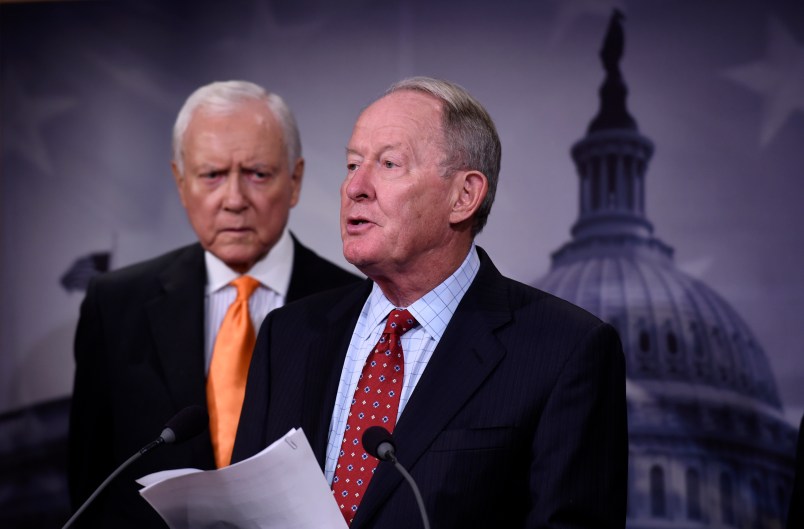Congressional Republicans aren’t sure what President-elect Donald Trump’s “plan” for replacing Obamacare is, but many were perfectly confident that it would fit in neatly with their effort to dismantle the Affordable Care Act, which has already been bogged down intra-party disagreements.
Key senators in the repeal effort admitted this week — after Trump told the Washington Post that he would be unveiling a plan that would bring “insurance for everybody” — that they had not seen details of the alleged plan. It was also unclear if they knew such a plan existed before Trump’s comments about it. Still, even though they weren’t sure exactly what Trump meant when he said “insurance for everybody,” they assumed his interpretation of the ideal Obamacare replacement matched their own: that the goal would be making the cost of insurance cheaper for consumers to expand “access,” rather than universal coverage.
“I think that it syncs up with what our members have been saying. We think that everybody ought to have access to affordable health care, and I assume that’s what he means by that statement, that’s how we’re proceeding,” Sen. John Thune (R-SD), a member of Republican leadership, told reporters Tuesday. When pressed on why Trump said insurance, and not access, Thune later conceded, “I guess you have to ask him what exactly he means.”
By Wednesday, it had appeared that Trump had walked back the promise in an interview with Axios,where he said, “We want people taken care of,” and that, “There will be nobody dying on the streets in a Trump administration.”
Whether Trump made his initial comments off-handedly or with thoughtful consideration, his suggestion that he would have his own plan, once his Health and Human Services nominee was confirmed, added another wrench in what were already very complicated mechanics for the GOP’s repeal efforts.
“I think he is going to have expectations that we pass it. But this is going to be a collaborative process,” Thune said. “There’s no way that, whatever he sends up here, just passes. We have a lot of members who will have input into it. And it will be shaped by members of Congress.”
Soon after Trump made his comments to the Post, both his advisers and his counterparts on the Hill tried to walk back the idea that what he meant was significantly different than what Republicans were already proposing.
“We can over-stress ourselves on trying to figure out that this President communicates differently than other presidents or members of Congress generally do, and I actually think it will all work out,” Sen. Roy Blunt (R-MO) told reporters Tuesday.
Sen. Orrin Hatch (R-UT) — who as, Finance Committee chair, leads one of the committees responsible for the repeal legislation — called Trump’s remark “a great goal.”
“I think he’ll find it very, very difficult to do,” Hatch added.
Not everyone shied away from laying a benchmark at expanded coverage.
“Ideally, our goal should be to expand the number of people who are insured by giving more choices to them, rather than the one-size-fits-all approach of Obamacare,” Sen. Susan Collins (R-ME) said. She has been among the handful of Senate Republicans raising concerns about rushing into a repeal of the Affordable Care Act without a replacement ready.
But a major question — beyond what Trump was promising — is whether his intention of delivering his own plan precludes Republicans voting swiftly on their own legislation.
“I think we’ll probably have pretty good insights into what that plan is and what the timing of its unveiling is, if there is going to be an unveiling, prior to that vote on reconciliation,” Thune said, referring to the legislative vehicle that will allow Republicans to repeal Obamacare while avoiding a filibuster.
HELP Committee Chair Lamar Alexander (R-TN), who has also sought to offer a vision of a replacement before repealing the ACA, said he welcomed Trump’s “executive leadership.”
“The process doesn’t work very well unless the executive proposes and the Congress disposes, so just because he recommends it doesn’t mean we have to do it,” Alexander said. “But it’s very helpful to have his recommendations, and then we can amend them and adjust them and see if we can come to some agreement.”







“I think that it syncs up with what our members have been saying. We think that everybody ought to have access to affordable health care …”
Anybody remember them saying that? Yeah, me neither.
“Now, Who wants a hat?”

Special GOPer Edition
By Wednesday, it had appeared that Trump had walked back the promise in an interview with Axios,where he said, “We want people taken care of,” and that, "There will be nobody dying on the streets in a Trump administration."
…
OH yeah? I am saving that comment for later use Donnie.
Unless he shoots that person on Fifth Avenue to prove his popularity.
Isn’t fun to see them all, the PEOTUS and Republican members of Congress, all try to fit in the driver’s seat?
And it seems to me with the above two groups they’ve put the Republican House members in a dog crate strapped to the roof of the stations wagon.
What kind of shot is he?